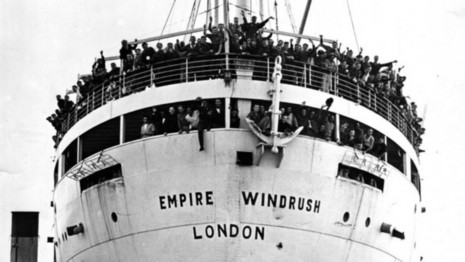
A Newcastle University academic has uncovered material which sheds new light on the history of the Windrush generation.
Their famous story of immigration hinges on the Empire Windrush, the ship which docked at Tilbury, in Essex, on a foggy day in June 1948. It was carrying several hundred Caribbean settlers and is said to herald the beginning of post-war mass migration to Britain.
But a previously uncatalogued radio report buried in the BBC’s archives and discovered by James Procter, Professor of Modern and Contemporary Literature from Newcastle University UK, reveals the Windrush story actually began, not as a journey to the UK but as a voyage out.
Broadcast from London to the Caribbean in April 1948, the BBC script read by West Indian cricketer Bertie Clarke opens:
“The Colonial Office have announced that the last big draft of airmen for repatriation will sail from Tilbury on May 8th on the Empire Windrush.” The transmission continues: “The Officers-in-Charge will be Flight Lieutenant Johnny Smythe, a West African who still carries around several bits of shrapnel in his lungs and side from his war service and Flight Lieutenant J.J. Blair of Jamaica who won the DFC.” The DFC is the Distinguished Flying Cross which is awarded to Royal Air Force personnel for acts of valour, courage or devotion.
The 500 airmen on board had fought in World War II and according to the broadcast, were “anxious” to get home to Jamaica, British Guiana, Trinidad, Barbados, British Honduras and Antigua.
The ship stopped at Jamaica, Trinidad and Bermuda before heading back to England on the famous journey to Tilbury which has entered history.
“The war wounds and war medals of this other Windrush generation are also, of course, the same generation that subsequently arrived in Britain shortly after,” says Professor Procter, who uncovered the report while carrying out research for his new book at the BBC’s archive in Caversham. “So why is it that we have chosen to remember the Windrush as a story of arrival, and not a story of departure?”
He suggests part of the reason is that the broadcast was never aired in Britain: “The BBC’s Overseas Services, were just that, and part of the tragedy our imperial past is connected to its mediation, which was typically a one-way exchange of information. As a result, West Indians knew everything about us but we knew little about them.”
Another reason, he suggests, is that the story of arrival is far more palatable than the neglected story of departure overlooked in the BBC archives. “If the legend of the Windrush’s arrival involves a narrative of colonial dependency in which the Caribbean is a grateful beneficiary,” he says. “The story of its departure points to Britain’s dependence on its empire during the darkest days of World War II.
“This story is just one small example of a much more pervasive and deep-seated amnesia that is, paradoxically, central to our national memory. Tragically, it is a story which the recent treatment of the Windrush generation shows, is still being forgotten.”
What the radio report reveals is the extent to which the story of the Windrush is in fact grounded in the internal history of those Caribbean men and women, who contributed to Britain’s Finest Hour.
The academic adds: “While scholars have long recognised the ship’s historical relationship to World War II – it was a German troopship – the Windrush continues to be remembered as an unprecedented story of arrival, or what the late Jamaican intellectual Stuart Hall would have called ‘the outside history that is inside the history of the English’.
“Lost narratives like this one in the BBC archive remind us that the history of the empire and Commonwealth is a domestic, and not just an overseas, history.”
Professor Procter is currently working with Caribbean poets whose work is being showcased at the British Library’s exhibition: ‘Windrush: Songs in a Strange Land’. Produced in collaboration with the AHRC-funded ‘Out of Bounds’ project, it uses place-based poetry to explore Windrush narratives of belonging.
Professor Procter’s research on Windrush will be included in Scripting Empire, his forthcoming book on West and West African Writers at the BBC with Oxford University Press.
